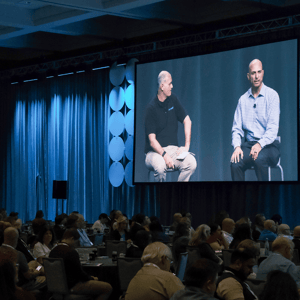
How to Choose the Right Event Management Agency
Everything you need to know about selecting an agency.
Click on a topic below to select the section you'd like to review.

Learn the benefits of working with an agency, and whether you actually need one for your event.
Read More
Consider the different types of agencies you might encounter and when you should begin your evaluation process.
Read More
From the basics of logistics to the more difficult evaluation of fit, here are the questions you should be asking every agency.
Read More
From their different pricing structures to the services they offer, here are things to look for.
Read More
From payment terms to all the legalese, here are the main things you should look for when signing a contract with your chosen agency.
Read More
Now comes the fun part: kicking off your partnership! Here are some tips to make that transition smooth.
Read More
Research phase
Do you need an event management agency?
No, you do not need an agency if:
- You have enough internal resources to manage your events
- You can't put aside at least 8% of your event budget to contribute to agency fees
Yes, you need an agency if:
- You host events that you can’t manage with internal resources
- You have a healthy budget to set aside for agency fees
- You want to find new avenues to improve your events
- You need support with standardized processes
Why work with an event management agency?
Whatever your scope of work, engaging an event management agency offers the opportunity to maximize your event’s impact on attendees while also managing your budget effectively and reducing the stress/burden on your already busy internal team.

- Expertise in managing similar events
- Diverse event services, customized to support your needs
- Collaborative partnership approach based on trust and shared values
- High-quality skills that complement your internal team’s capabilities
- Strategic thinking focused on achieving your goals
- Innovative ideas
- Standardized project management tools
- Flexible staffing resources, adjusted to reflect work cycles
- Ability to drive down costs through improved project management and contract negotiations
- Reduced legal/regulatory, financial, operational, and brand reputation risks

Discovery phase
How many agencies should you evaluate?
Ideally, you should evaluate two (2) to four (4) event management agencies to understand the options available to you and to make the best decision.
When should you select an agency?
Conduct your review up to 12 months before a major event, and select the agency at least eight (8) months before the event is scheduled. That gives the agency time to understand your priorities, recommend event locations, make strategic suggestions, and implement them effectively.
What types of agencies might you encounter?
As you begin your event management agency search, you’ll likely come across multiple different types of agencies. It can be hard to determine what type is best for your event, and whether they can help you with what you need.
- Full-service event management agency: This is the all-the-bells and whistles agency that can handle all the logistics for your event. They will be the ones helping you build a strategy for your event and then managing all the planning details. Typically, these companies work nationwide or even worldwide.
- Experiential marketing agency: These agencies work similarly to full-service event management agencies, with an emphasis on activations and marketing-focused events. These are typically the “go big” agencies that feature a lot of flashy, cool, trendy events.
- Destination management company (DMC): These companies are present in nearly every city and are focused on helping you source different needs for your event (e.g. decor and other vendors). They can often be leveraged for planning, but they are more task-oriented than a full-service agency. DMC’s work specifically in smaller markets, and they’re best for point solutions and local expertise.
- Production company: Event management and production can often be confused. Production typically refers to A/V services needed for an event. Many of these companies also offer event management services, but it’s typically not their first expertise.
- Site selection company: Some companies specialize solely in site selection services. Many event management companies will also offer these services alongside their event planning services, but if you’re purely looking for site selection, you may want to find a specialized group.
15 questions to ask when evaluating an event management agency.
As you conduct your evaluation process, you likely can answer many of these questions purely from the companies’ websites. Keep a document that helps you compare the answers between the agencies you’re evaluating.
|
What expertise do you have? |
Consider the following factors:
|
|
What types of events do you have experience with? |
Not all event management companies offer the same event-specific expertise. Make sure they can manage the specific type of event you’re hosting.
|
|
What size events do you have experience with? |
Hosting a 100-person conference can be similar to hosting a 1,000-person conference, but there are certainly logistical differences. Make sure the agencies you’re evaluating have experience with similar-sized events to yours, and have them provide examples. |
|
What services do you offer? |
This is a simple, but important check-the-box evaluation. Make sure they can do all the things you need them to! |
|
What services do you NOT offer? |
Just as importantly, you need to be clear about what services the company does not offer. For instance, attendee acquisition might be a service they ask clients to manage. |
|
What is the average budget your clients work with? |
This again helps you understand whether your budget is practical for their typical portfolio. If they consistently show you examples well above your budget, you may not be the right fit. |
|
What markets do you work in? |
If you’re looking to host your event in multiple places throughout the years, it’s helpful to have an event management partner that can work in various different locations. |
|
What processes do you have in place that we can leverage? |
Have them showcase any standardized processes that can aid in your event planning process. The more detailed and prepared they are, the more likely they are to be a good event management partner. Also consider whether they are willing to work within your standardized processes. If they are inflexible, they might not be the right choice. |
|
What technologies do you use? |
Any budget, timeline, or other planning tools should be backed by powerful technology. Make sure they can provide examples of different tools they’ve used with other clients. |
|
How do you manage budgets? |
Budget management is extremely important and you should have an agency that can guide you throughout the process, including:
|
|
How do you provide value? |
This is a great question to ask, especially if you’ve shared your goals with the event agency. They should be able to articulate specific things they can bring to the table to enhance your event. |
|
What industry connections do you have? |
The best event management agencies have a wide network of suppliers and contractors that they can bring to your event. |
|
What do your customers say about you? |
Get testimonials or reviews from their current clients! |
|
How would you recommend we plan this event? |
Don’t expect an agency to do the work for you before having a signed contract – but you can see if they might have any tips on planning. This can give you a window into how they think and approach challenges. |
|
Are you a good fit for us? |
Here are several factors that impact whether an agency might be a good fit for you:
|
What questions are not important in the evaluation process?
We hate to say that any questions aren't important to your evaluation, but there are certain criteria that should be secondary when evaluating event management agencies. Here are our recommendations on questions to leave out or move to the end of the process:
Do you have experience in our particular industry?
Don’t pigeonhole yourself into thinking you need an agency that understands your exact market. If anything, you can take best practices from other industries and apply them to your event.
Do you have any award recognitions?
Awards can be a great way to understand if an event management agency has 3rd-party approval. However, keep in mind that many award agencies charge for entry into their awards programs, and results can be skewed. Plus, awards don’t always tell you what the customer thinks of their agency.
We recommend instead asking for testimonials from current clients and even references that you can follow up with personally. You will likely get much more candid insight into the agency’s professionalism and work than you would with a stamp of approval from an awards company.
How big is your agency?
While you’ll want plenty of resources to make sure your event runs smoothly, we don’t recommend opting purely for larger agencies. Small agencies have plenty of experience managing large-scale events and often you’ll find more personal customer service at boutique agencies.
Are you local to XYZ market?
Sometimes this can be an important question if you’re planning to only host an event in one location and you need local services.
Oftentimes, though, this question can paint you into a corner. If you plan to move your event next year, you’ll want an event management partner that can work in different markets so you don't have to go out and evaluate new agencies every year. Ideally, the agency you choose can work in every market you need, while finding partners in each market to provide the best services for your event.
How much does your agency cost to work with?
Yes, this is an important question to ask. But it should be one of the last evaluations you make when deciding to work with an agency. The cheapest option isn’t always the best, and you’ll want to understand all the different factors (such as efficiencies or savings they can bring you) before looking at the management fee alone.

Evaluation phase
How do you differentiate agencies?
Once you’ve gotten the answers to the questions above, how do you now begin your evaluation process?
We recommend looking at a few key parameters to help you make your decision:
- How do they stack up against each other in experience?
- Do they come to the table with fresh ideas?
- Do they provide transparent and consistent communication throughout the sales process?
- Don’t underestimate the power of personality fit. If you liked the team at one company more than another, listen to that! The people you work with can make or break your event.
- Cost should always be a differentiating factor, but make sure it's not the ONLY factor.
What are the different pricing structures you may see?
Every event management agency prices their services slightly differently, and it can be difficult to compare apples-to-apples. Here are the pricing structures you'll likely encounter:
- Flat: One price typically based on estimated project hours that will be known throughout the entire process.
- Hourly: Can fluctuate depending on the number of hours actually worked on your project.
- Percentage: Based on a percentage of your overall budget, which does not incentivize the company to save you money.
- Per person: Based on the number of people attending your event. This is typically where markup is seen.
- Retainer: Similar to a flat fee but billed on a monthly or quarterly basis.
Red flags in the evaluation process.
As you begin to evaluate different agencies, keep in mind that flashy images or large brand logos don't always tell the whole story.
Throughout the selection process, here are some red flags to keep an eye out for:
- Slow to send proposals
- No transparency around pricing
- No examples of past work
- Inconsistencies with communication
- No details around processes
- Demanding to see a budget to provide a proposal

Selection phase
What to look for in your event management agency contract.
Once you've selected your preferred event management agency, here are some things to evaluate in your contract:
- Make sure you and the agency are on the same page with the scope of services.
- Are there any hidden fees you need to be aware of (e.g. hourly rates, day rates)?
- Do you have a clearly stated point of contact?
- What is the invoicing schedule?
- Are there fair legal protections for both you and the agency? Make sure to have your legal team review your contracts in full.
We recommend walking through the contract with a representative from the agency to ensure all of your questions are answered and any confusing language is cleared up before you sign. This will help get your partnership off on the right foot!

Post-selection phase
How to be successful with the agency you choose.
As with any relationship, it's important to consider how you can best work together. Here are our recommendations:
- Understand and clearly communicate your objectives
- Clearly communicate your expectations
- Be willing to try new ideas
- Hold yourself accountable for deliverables
- Understand the planning process, fees, requirements, and more PRIOR to signing a contract
- Set up your KPIs early and continue to track throughout the process
- Provide any history on the event, including past survey results


